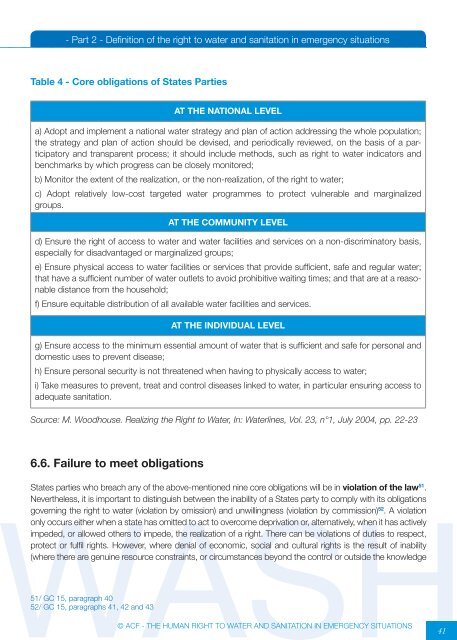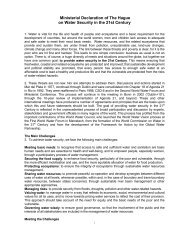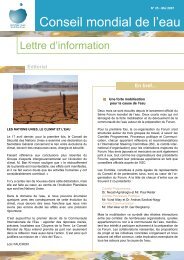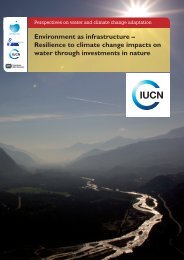the human right to water and sanitation in emergency situations
the human right to water and sanitation in emergency situations
the human right to water and sanitation in emergency situations
You also want an ePaper? Increase the reach of your titles
YUMPU automatically turns print PDFs into web optimized ePapers that Google loves.
- Part 2 - Def<strong>in</strong>ition of <strong>the</strong> <strong>right</strong> <strong>to</strong> <strong>water</strong> <strong>and</strong> <strong>sanitation</strong> <strong>in</strong> <strong>emergency</strong> <strong>situations</strong><br />
Table 4 - Core obligations of States Parties<br />
AT THE nATIonAL LEVEL<br />
a) Adopt <strong>and</strong> implement a national <strong>water</strong> strategy <strong>and</strong> plan of action address<strong>in</strong>g <strong>the</strong> whole population;<br />
<strong>the</strong> strategy <strong>and</strong> plan of action should be devised, <strong>and</strong> periodically reviewed, on <strong>the</strong> basis of a participa<strong>to</strong>ry<br />
<strong>and</strong> transparent process; it should <strong>in</strong>clude methods, such as <strong>right</strong> <strong>to</strong> <strong>water</strong> <strong>in</strong>dica<strong>to</strong>rs <strong>and</strong><br />
benchmarks by which progress can be closely moni<strong>to</strong>red;<br />
b) Moni<strong>to</strong>r <strong>the</strong> extent of <strong>the</strong> realization, or <strong>the</strong> non-realization, of <strong>the</strong> <strong>right</strong> <strong>to</strong> <strong>water</strong>;<br />
c) Adopt relatively low-cost targeted <strong>water</strong> programmes <strong>to</strong> protect vulnerable <strong>and</strong> marg<strong>in</strong>alized<br />
groups.<br />
AT THE CoMMunITY LEVEL<br />
d) Ensure <strong>the</strong> <strong>right</strong> of access <strong>to</strong> <strong>water</strong> <strong>and</strong> <strong>water</strong> facilities <strong>and</strong> services on a non-discrim<strong>in</strong>a<strong>to</strong>ry basis,<br />
especially for disadvantaged or marg<strong>in</strong>alized groups;<br />
e) Ensure physical access <strong>to</strong> <strong>water</strong> facilities or services that provide sufficient, safe <strong>and</strong> regular <strong>water</strong>;<br />
that have a sufficient number of <strong>water</strong> outlets <strong>to</strong> avoid prohibitive wait<strong>in</strong>g times; <strong>and</strong> that are at a reasonable<br />
distance from <strong>the</strong> household;<br />
f) Ensure equitable distribution of all available <strong>water</strong> facilities <strong>and</strong> services.<br />
AT THE InDIVIDuAL LEVEL<br />
g) Ensure access <strong>to</strong> <strong>the</strong> m<strong>in</strong>imum essential amount of <strong>water</strong> that is sufficient <strong>and</strong> safe for personal <strong>and</strong><br />
domestic uses <strong>to</strong> prevent disease;<br />
h) Ensure personal security is not threatened when hav<strong>in</strong>g <strong>to</strong> physically access <strong>to</strong> <strong>water</strong>;<br />
i) Take measures <strong>to</strong> prevent, treat <strong>and</strong> control diseases l<strong>in</strong>ked <strong>to</strong> <strong>water</strong>, <strong>in</strong> particular ensur<strong>in</strong>g access <strong>to</strong><br />
adequate <strong>sanitation</strong>.<br />
Source: M. Woodhouse. Realiz<strong>in</strong>g <strong>the</strong> Right <strong>to</strong> Water, In: Waterl<strong>in</strong>es, Vol. 23, n°1, July 2004, pp. 22-23<br />
6.6. Failure <strong>to</strong> meet obligations<br />
States parties who breach any of <strong>the</strong> above-mentioned n<strong>in</strong>e core obligations will be <strong>in</strong> violation of <strong>the</strong> law 51 .<br />
Never<strong>the</strong>less, it is important <strong>to</strong> dist<strong>in</strong>guish between <strong>the</strong> <strong>in</strong>ability of a States party <strong>to</strong> comply with its obligations<br />
govern<strong>in</strong>g <strong>the</strong> <strong>right</strong> <strong>to</strong> <strong>water</strong> (violation by omission) <strong>and</strong> unwill<strong>in</strong>gness (violation by commission) 52 . A violation<br />
only occurs ei<strong>the</strong>r when a state has omitted <strong>to</strong> act <strong>to</strong> overcome deprivation or, alternatively, when it has actively<br />
impeded, or allowed o<strong>the</strong>rs <strong>to</strong> impede, <strong>the</strong> realization of a <strong>right</strong>. There can be violations of duties <strong>to</strong> respect,<br />
protect or fulfil <strong>right</strong>s. However, where denial of economic, social <strong>and</strong> cultural <strong>right</strong>s is <strong>the</strong> result of <strong>in</strong>ability<br />
(where <strong>the</strong>re are genu<strong>in</strong>e resource constra<strong>in</strong>ts, or circumstances beyond <strong>the</strong> control or outside <strong>the</strong> knowledge<br />
51/ GC 15, paragraph 40<br />
52/ GC 15, paragraphs 41, 42 <strong>and</strong> 43<br />
© ACF - THE HUMAN RIGHT TO WATER AND SANITATION IN EMERGENCY SITUATIONS<br />
41

















